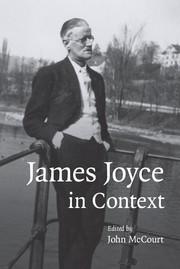Book contents
- Frontmatter
- Contents
- Notes on contributors
- Preface
- List of abbreviations
- PART I LIFE AND WORKS
- PART II THEORY AND CRITICAL RECEPTION
- PART III HISTORICAL AND CULTURAL CONTEXTS
- 14 Being in Joyce's world
- 15 Dublin
- 16 Nineteenth-century lyric nationalism
- 17 The Irish Revival
- 18 The English literary tradition
- 19 Paris
- 20 Trieste
- 21 Greek and Roman themes
- 22 Medicine
- 23 Modernisms
- 24 Music
- 25 Irish and European politics: nationalism, socialism, empire
- 26 Newspapers and popular culture
- 27 Language and languages
- 28 Philosophy
- 29 Religion
- 30 Science
- 31 Cinema
- 32 Sex
- Further reading
- Index
23 - Modernisms
Published online by Cambridge University Press: 14 July 2009
- Frontmatter
- Contents
- Notes on contributors
- Preface
- List of abbreviations
- PART I LIFE AND WORKS
- PART II THEORY AND CRITICAL RECEPTION
- PART III HISTORICAL AND CULTURAL CONTEXTS
- 14 Being in Joyce's world
- 15 Dublin
- 16 Nineteenth-century lyric nationalism
- 17 The Irish Revival
- 18 The English literary tradition
- 19 Paris
- 20 Trieste
- 21 Greek and Roman themes
- 22 Medicine
- 23 Modernisms
- 24 Music
- 25 Irish and European politics: nationalism, socialism, empire
- 26 Newspapers and popular culture
- 27 Language and languages
- 28 Philosophy
- 29 Religion
- 30 Science
- 31 Cinema
- 32 Sex
- Further reading
- Index
Summary
Early in Stephen Hero, the ambitious young Stephen Daedalus expresses confidence by noting ‘some movement proceeding “out in Europe”’ (SH 35). Even in the midst of fierce proud individuality, he acknowledges here the power of others who are equally determined to transform the basis of culture. There can be no doubt that for Joyce too the bid for an artistic vocation depended on the consciousness of inhabiting a wide modernist milieu. Crucially, though, for Joyce, as for his avatar Stephen, the ferment was ‘out’ beyond Ireland, a source of confirmation and inspiration, but at a great remove from his national and local world. It will be the burden of this chapter to locate Joyce within an emerging and maturing modernism. Part of the task will be to show the changes in the wider culture that affected (and were affected by) Joyce's own work. But the central task will be to indicate strains of experiment that he may have ignored or repudiated but that help to place him within the broader episodes of modernism.
By the time Joyce came to intellectual self-consciousness in the last years of the nineteenth century, it was easy to recognise, but also still easy to deny, the provocations that Daedalus notices ‘out in Europe’. Yet these provocations had their own complex history. It is first of all worth remembering that before it was a movement of difficult formal experiment, modernism was a challenge in the realm of ideas, a counter-ideology.
- Type
- Chapter
- Information
- James Joyce in Context , pp. 262 - 274Publisher: Cambridge University PressPrint publication year: 2009
- 1
- Cited by

